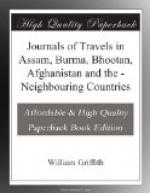The general opinion is, and it is one which I have not discarded entirely, that he threw himself into Herat, that he was throughout the siege daily employed in the front of the garrison, and that it is owing to his personal exertions that Herat was saved. I hear however on good authority that he was at Herat accidentally, and wished to leave it when the besiegers appeared, but was prevented by want of funds. So anxious was he however to get away, as his leave of absence had expired, that he was obliged to discover himself to Yar Mahommed, and request loans to enable him to rejoin India. The Vizier at once secured him, took him to Kamran, and hindered him from leaving, forcing him indeed to the dangerous elevation of British Agent at Herat. His merits, if this be true, rest on very different grounds from those generally supposed; his courage however has been proved of a high moral cast.
The Joussa, the Moolla tells me, is the Kan Shootur or Shootur Kan. Burnes’ account of the Turunjbeen or manna is correct, except perhaps in the limits he assigns to its production. It is at any rate produced here and sold in the bazar, its production while the plant is in flower is curious, and worthy of examination; it may however be deposited by an insect, in which case the probable period of its production would be that of inflorescence.
There is some cultivation of Indian corn here, the plants have now attained one-third of their growth.
Except in the immediate vicinity of the town, nothing can exceed the sterility of the valley, or rather its desolation: scarcely a plant, beyond the Peganum and Joussa, is to be found.
Khaisee, an excellent smooth skinned apricot, is now ripe, and is of light yellowish colour, sometimes faintly spotted; it is a product from grafts, the seeds are useless, as they do not continue the good qualities of the fruit: it is here grafted on zurd-aloo, thulk, Potentilla quinquefolia.
Melons and grapes are now coming in; the former, at least those I have seen, have pale pulp, and are not superior. The grapes first ripe are the ordinary black sort: we tasted yesterday some very good ones in the Moolla’s garden. The Kismiss are especially delicate, and another large sort of very fine rich flavour, both were rather unripe. Those for packing are still unripe. The trenches in this garden are very deep: the vines are planted on the northern face only.
Gardens are very common to the south-west of the town. The valley of the Arghandab is the most fertile part of Khorassan I have yet seen. A strip of cultivation extends along the banks of the river, and from these last not being high, the stream is easily diverted into channels for irrigation. Seen from any of the neighbouring hills, the valley presents one uniform belt of verdure, almost as far as the eye can reach, and the view up and down is of some extent. The chief cultivation is wheat, barley, and lucerne; Chummuns also occur. Gardens abound, together with fine groves of mulberry trees, the former are walled in, and are verdant to a degree.




